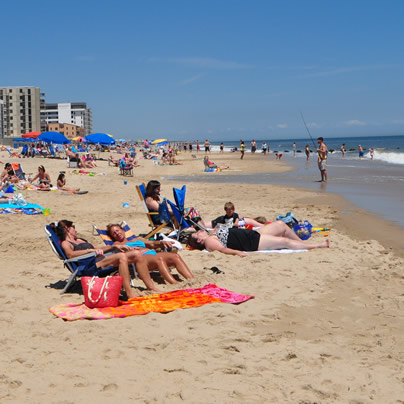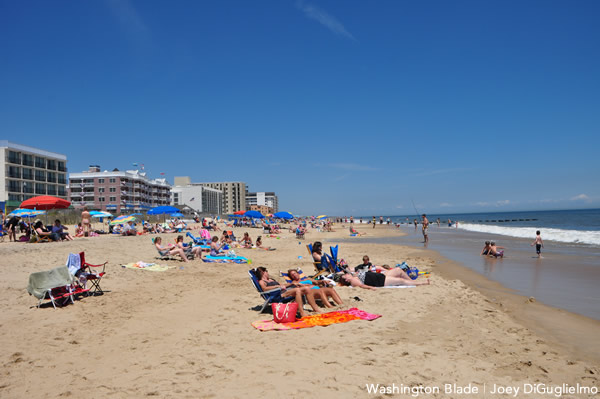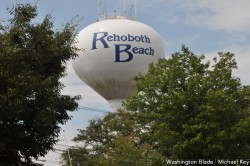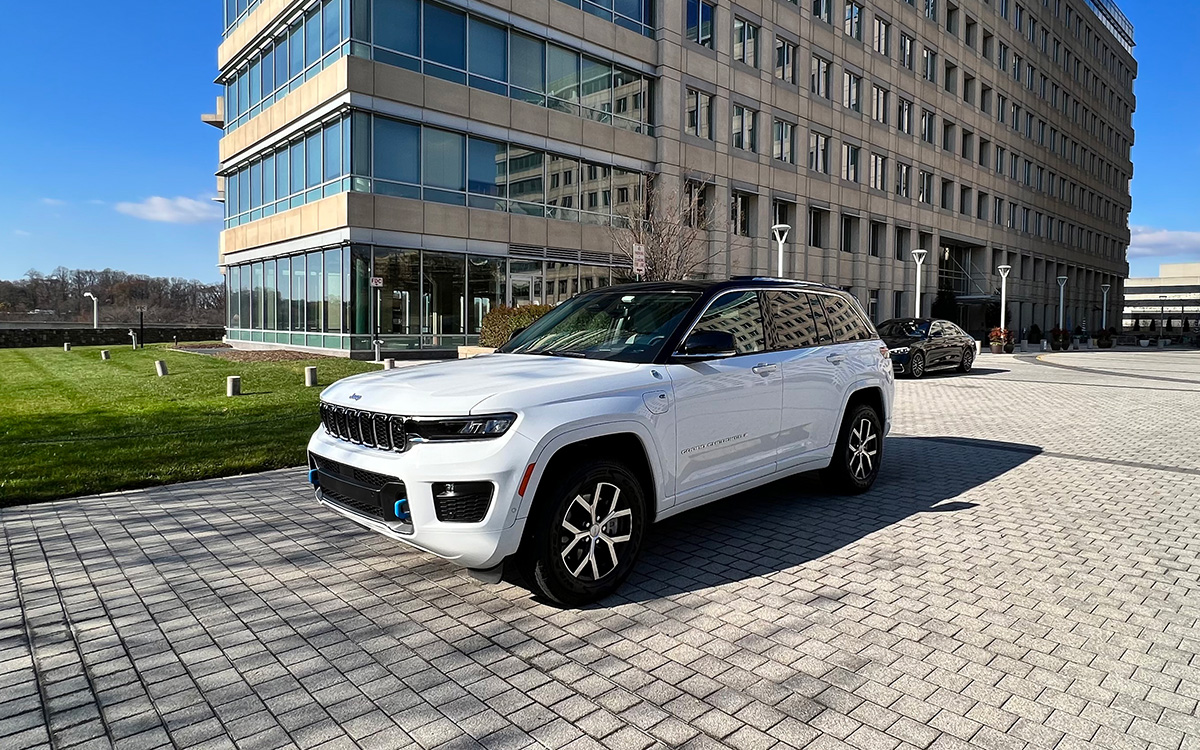Living
Rehoboth ready for record crowds
Spared Sandy’s wrath, beach resort expected to draw more visitors


Summer at Rehoboth Beach. (Blade file photo by Joey DiGuglielmo)
7th annual Washington Blade
Summer Kick-Off Party
Friday, May 17, 5-7 p.m.
Blue Moon
35 Baltimore Ave., Rehoboth
Virtually unscathed by the effects of Hurricane Sandy, all indications are this summer will be a busy one in Rehoboth Beach, Del. And with the arrival of marriage equality in the state, locals are also expecting a busy summer of beach weddings.
View Rehoboth Beach in a larger map
Beach replenishment and flood control projects should be concluded by Memorial Day. The Chamber of Commerce reports that summer rentals to date are running at least 30 percent above last year and businesses are preparing for an influx of new visitors headed farther south this year following the damage to some New York and New Jersey-area beaches.
John Glenstrup, an owner of the gay bar Rigby’s on Rehoboth Avenue, said that in addition to visitors coming here from the New Jersey and New York beaches, “people feel more secure about the economy as gas prices fall, employment is up, and the housing market is improving.”
With an increase in visitors and traffic, gay City Commissioner Patrick Gossett noted that the ParkMobile system, which was introduced last year, will be used again this year. Pre-register at parkmobile.com or by calling 877-727-5758.
Gossett also said that this year the city will experiment with providing 180 parking spaces for scooters at several locations around the city. Permits for scooter use and parking passes are available at the Parking Meter Division located behind the Convention Center.
The Blue Moon (35 Baltimore Ave.) begins its 32nd summer with a remodeled front bar and Pamala Stanley returns Memorial Day weekend through the summer, Sundays through Thursdays 6-8:30 p.m. Cloud Nine closed in 2012 and was set to be demolished, but the Cape Gazette reported that it has been spared the wrecking ball for now and has been rented for the summer. Aqua (57 Baltimore Ave.), with its scantily attired servers, returns for another season this weekend. The L Bar (622 Rehoboth Ave.), Rigby’s (404 Rehoboth Ave.) and Big Sissies (715 Rehoboth Ave.) are all thriving. The gay-owned Purple Parrot (134 Rehoboth Ave.) is celebrating its 15th anniversary and the outdoor Biergarten has reopened.
The Frogg Pond (First and Rehoboth Avenue) has been renamed The Pond. Lesbian-owned establishments include Lori’s Café (39 Baltimore Ave.), now in its 17th season, Rehoboth Ale House (15 Wilmington Ave.), Seafood Shack (42 ½ Baltimore Ave.), and Charcoal Grill, located in the Food Lion Shopping Center on Route 1. Gelato Gal has moved and now also serves barbeque. It is located on Route 1 at Bay Vista Road.
Just before Memorial Day last year, Modern Mixture (62A Rehoboth Ave.) was opened by Leo Cabrera, popular server formerly at Mariachi’s. Its food is a fusion of Mexican, Mediterranean and Asian selections and it just got its liquor license this year.
The owners of Aqua have opened a café, Maggio and Shields, on the second level of First Street Station located at the corner of Rehoboth Avenue and First Street, and the owners of the Pond have MIXX (26 Baltimore Ave.). The new Lingo’s Market is scheduled to open Saturday in the Village by the Sea Mall. Gay-owned Universal Gear (46 Baltimore Ave.) has already opened for the season. If you like Italian food, check out the new Frank & Louie’s Italian Specialties (58 Baltimore Ave.) and a new Touch of Italy is rumored to (finally) be opening on Route 1 near Nage by Memorial Day.

(Washington Blade photo by Michael Key)
Of course, Rehoboth is not only about eating and drinking. There are lots of other activities and many businesses throughout the city that are LGBT owned or friendly to the community.
There will be numerous events throughout the area all summer, including a monthly Art Walk, shows at Clear Space Theatre on Baltimore Avenue and readings at Proud Bookstore (Baltimore Avenue at the Village by the Sea Mall).
As Rehoboth Beach has become a more popular place to live, play and shop, not all of the activities are restricted to downtown. You can find plenty of outlet shops, restaurants, the Midway movie theater and specialty stores along Route 1, also known as Coastal Highway.
Several events will be sponsored by CAMP Rehoboth, the local gay and lesbian community center. They now have a theater attached to the Center (37 Baltimore Ave.). The popular Rehoboth Foodie blogger now has an app — Rehoboth in my Pocket — for your iPhone or Android devices.
The main two beaches that attract an LGBT crowd are Carpenter’s Beach (better known as Poodle Beach) at the south end of the Boardwalk or Gordon’s Pond in Cape Henlopen State Park, north of the city.
Real Estate
The rise of virtual home tours
Adapting to changing consumer preferences in spring real estate

In today’s dynamic real estate market, the spring season brings not only blooming flowers but also a surge of activity as buyers and sellers alike prepare to make their moves. However, in recent years, there’s been a notable shift in how consumers prefer to explore potential homes: the rise of virtual tours.
For the LGBTQ community, these virtual experiences offer more than just convenience; they provide accessibility, safety, and inclusivity in the home buying process.
Gone are the days of spending weekends driving from one open house to another – unless that’s your thing of course, only to find that the property doesn’t quite match expectations. With virtual tours, you can explore every corner of a home from the comfort of your own space – find something interesting? Schedule a showing with any LGBTQ Realtor at GayRealEstate.com.
This is particularly significant for LGBTQ individuals, who may face unique challenges or concerns when attending in-person showings. Whether it’s the ability to discreetly view properties without fear of discrimination or the convenience of touring homes located in LGBTQ-friendly neighborhoods across the country, virtual tours offer a sense of empowerment and control in the home buying process.
Moreover, virtual tours cater to the diverse needs of the LGBTQ community. For couples or families with busy schedules or those living in different cities or states, these digital walkthroughs provide a convenient way to view properties together without the need for extensive travel. Additionally, for individuals who may be exploring their gender identity or transitioning, virtual tours offer a low-pressure environment to explore potential living spaces without the added stress of in-person interactions.
At GayRealEstate.com, we understand the importance of adapting to changing consumer preferences and leveraging technology to better serve our community. That’s why our agents offer an extensive selection of virtual tours for LGBTQ individuals and allies alike – visit our website, choose an agent and within minutes you’ll have access to the Multiple Listing Service (MLS) via their website.
From cozy condominiums in bustling urban centers to sprawling estates in picturesque suburbs, virtual tours showcase a wide range of properties tailored to diverse tastes and lifestyles.
In addition to virtual tours, GayRealEstate.com provides comprehensive resources and support to guide LGBTQ buyers and sellers through every step of the real estate journey. Our network of LGBTQ-friendly agents is committed to providing personalized service, advocacy, and representation to ensure that all individuals feel respected, valued, and empowered throughout the process. Plus, we are happy to provide a free relocation kit to any city in the USA or Canada if you are a home buyer.
As we embrace the spring season and all the opportunities it brings in the real estate market, let’s also celebrate the power of virtual tours to revolutionize the way we find and experience our future homes. Whether you’re searching for your first apartment, forever home, or investment property, GayRealEstate.com is here to help you navigate the exciting world of real estate with confidence, pride, and inclusivity.
Jeff Hammerberg is founding CEO of Hammerberg & Associates, Inc. Reach him at [email protected].
Advice
Should I divorce my husband for the hot new guy in our building?
Debating whether to leave or stay after the sex goes cold

Dear Michael,
I’ve been with my husband for 10 years and the sex is pretty much gone. It stopped being exciting a long time ago and pretty much the only time we ever do it is with the occasional third.
A really hot guy moved into our building about a year ago. We would see each other sometimes in the elevator or at our building’s gym and we started talking and really hit it off. Mark is 15 years younger than I but we seem to have a lot in common. We started hooking up and the sex is amazing.
I haven’t told my husband because it’s breaking our rule about no repeats. I have to say that the secrecy is hot. It’s kind of a thrill to take the elevator upstairs when I say I’m going on an errand. But it’s more than that. I have a connection with Mark that is far more amazing than what I have ever felt with my husband. Not just the sex. We just enjoy being together, talking about anything and everything.
My husband went to visit his family last weekend and I spent the whole time with Mark. Since then I can’t stop thinking that I want to leave my husband and be with Mark.
Part of me thinks this is a crazy mid-life crisis. I mean, this kid’s in a totally different place in life. But we have mind-blowing sex and a fantastic connection. I’d like your thoughts on how to proceed.
Michael replies:
You’ve got a lot to consider.
First: Sex with a long-term partner changes over time. It tends to be less about erotic heat and more about the connection with a person whom you love. In other words, it’s being with the person you’re with that makes the sex meaningful and even great. Having a good sexual relationship with a long-term partner comes far more from a heart connection than from a crotch attachment.
Second: You seem ready to throw your relationship under the bus pretty quickly, without addressing other problems in the relationship besides sex. When you are sneaking around, lying, and rule-breaking , I don’t see how you can look your husband in the eye; and if you can’t look him in the eye, you certainly can’t have even a half-way decent relationship.
Yet another point to consider: Affairs pretty much always seem more exciting than marriage. The partner is new, which almost automatically makes the sex hotter; the secrecy is a thrill; and you don’t have to deal with paying the rent, house chores, and all the petty annoyances of living up-close with someone day-in, day-out.
You are bringing lots of energy to your affair, and everything about it is exciting. You are bringing no energy — at least no positive energy — to your marriage. You get what you put into a relationship.
Divorce is not something that should be entered into lightly. Be aware that if you leave your husband for Mark, you will no doubt find over time that the sex becomes less exciting and that the connection is not always fantastic. No surprise, 75 percent of marriages that begin with affair partners end in divorce. While I don’t think statistics predict what will happen to any particular couple, believing that you will have a significantly better relationship with your affair partner than you did with your husband sets you up for likely disappointment.
Many gay men focus on “hot sex” as the big draw, pursuing a lot of sex with a lot of men, and/or pursuing an ongoing series of relationships that last until the sex cools. If that’s what you want, that’s fine. But it’s a different path from pursuing a close and loving long-term relationship, which involves knowing someone well and having him know you well; collaborating on getting through the hard stuff life throws at us; finding ways to make peace with disappointment; and consistently striving to be someone worth being married to.
How to proceed? While you are the only person who should make that decision, I would suggest that whatever your choice, keep in mind that marriage can be more than what you’ve made of it, so far.
Michael Radkowsky, Psy.D. is a licensed psychologist who works with couples and individuals in D.C. He can be found online at michaelradkowsky.com. All identifying information has been changed for reasons of confidentiality. Have a question? Send it to [email protected].
Autos
Sport haulers: Jeep Grand Cherokee, Mercedes GLE-Class
Updated cabins, adept handling, and more

Now that March Madness and the Masters are over, it’s time for, well, everything else. For my husband and me, this means water sports, as in kayaks and rowing sculls, which is why we trekked to the Potomac for the George Washington Invitational regatta last weekend.
Alas, high winds splashed cold water on the event, canceling much of it. But there was still plenty of spirited camaraderie to rival “The Boys in the Boat.”
And I was reminded of my time years ago as a rower with D.C. Strokes, ferrying teammates to races up and down the East Coast. Back then my ride was a dated, rather cramped four-door sedan.
If only we could have paddled around in a sporty SUV like the two reviewed here. Now that would have been some smooth sailing (wink-wink).
JEEP GRAND CHEROKEE
$40,000
MPG: 19 city/26 highway
0 to 60 mph: 7.5 seconds
Maximum cargo room: 37.7 cu. ft.
PROS: Updated cabin, adept handling, strong towing
CONS: So-so gas mileage, no third row, pricey trim levels
IN A NUTSHELL: Rough, tough and buff. It’s doesn’t get much more butch than a Jeep. This year’s Grand Cherokee is no exception, with rugged looks, expert off-road capability and better-than-average towing capacity of 6,200 pounds.
There are a dizzying number of trim levels—more than a dozen—starting with the barebones base-model Laredo at an affordable $40,000. The lineup tops out with the Summit Reserve 4xe PHEV, which is almost twice the price at $76,000 and one of various plug-in hybrid versions available. Those plug-in hybrids can drive up to 25 miles on all-electric power before the four-cylinder gas engine kicks in. Otherwise, you can choose from a standard V6 or V8. Gas mileage on all trim levels is basically the same as the competition.
Where the Grand Cherokee really shines is in the handling. More refined than a Wrangler but less lavish than a Land Rover, this Jeep maneuvers just as well on city streets and highways as it does on bumpier terrain.
I tested the mid-range and mid-priced Overland, which comes standard with four-wheel drive and large 20-inch wheels. It also boasts a slew of niceties, such as quilted upholstery, panoramic sunroof and high-tech digital displays. These include a 10.25-inch infotainment touchscreen and rear-seat entertainment system.
The nine-speaker Alpine stereo, designed specifically for the Grand Cherokee, is pleasing. But I really wanted to hear the boffo 19-speaker McIntosh surround-sound system that Jeep also offers. Sigh, it’s only available on the premium Summit trim level.
MERCEDES GLE-CLASS
$64,000
MPG: 20 city/25 highway
0 to 60 mph: 6.6 seconds
Maximum cargo room: 33.3 cu. ft.
PROS: Lush interior, silky-smooth suspension, speedy
CONS: Some confusing electronics, tight third row, many competitors
IN A NUTSHELL: For a more high-class hauler, there’s the Mercedes GLE-Class. This midsize SUV is similar in size to the Jeep Grand Cherokee. But instead of seating five passengers, the GLE can carry up to seven. Sure, legroom in the optional third row may be tight for taller travelers, but it’s perfect for a cocky cockswain or two.
Six trim levels, ranging from the base-model GLE 350 to two high-performance AMG models. For eco-conscious buyers, the GLE 450e plug-in hybrid arrived earlier this year and can run on battery power alone for almost 60 miles.
My test car was the top-of-the-line AMG 63 S 4Matic, a head-turner in every way. Priced at a whopping $127,000, this GLE looks best in glossy black with the Night Package, which includes tasteful jet-black exterior accents and matte-black wheels. To complete the Darth Vader effect, there’s a deep, menacing exhaust rumble that’s downright threatening.
You expect such a ride to be wicked fast, and it is: 0 to 60 mph in a blistering 3.7 seconds. Yet the carbon ceramic brakes with their devil-red calipers are equally impressive in slowing things down quickly.
Inside, each GLE comes with two large digital displays on the elegantly sculpted dashboard. My favorite feature is the “Hey Mercedes” digital assistant, which responds to voice commands such as opening or closing the sunroof, operating the infotainment system or activating the climate controls.
It’s hard to find sport seats that are more comfortable, especially with the heavenly massage function (though those massage controls could be a bit more user-friendly.) For AMG models, the seats come with red-contrasting stitching and red seatbelts—a nod to the devilish demeanor under the hood.
Considering all the SUVs available in showrooms, few make quite the splash of a GLE.

-

 State Department4 days ago
State Department4 days agoState Department releases annual human rights report
-

 South America2 days ago
South America2 days agoArgentina government dismisses transgender public sector employees
-

 District of Columbia2 days ago
District of Columbia2 days agoCatching up with the asexuals and aromantics of D.C.
-

 Politics4 days ago
Politics4 days agoSmithsonian staff concerned about future of LGBTQ programming amid GOP scrutiny












